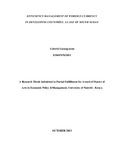| dc.description.abstract | Since independence in July 2011, South Sudan adopted a fixed exchange rate regime. This
system has been faced with growth of black market for dollars; rent seeking behaviour,
corruption and poor controls on channels of distributing dollars with licenses given to wellconnected
political elites and business brokers.
Foreign currency management in developing countries is an instrumental tool used by
governments to direct economic growth and macroeconomic stability. In this research, the
research evaluated channels for distribution of dollars; controls, oversight and legislations on
management of foreign currency; determined the cause of black market’s premium; and
identified gaps and proposed recommendations that will enhance management of foreign
currency management in South Sudan.
The research reviewed processes, controls, oversight roles and legislations on foreign
currency management in South Sudan; analysed channels and data on supply of foreign
currency to the market; and conducted focus interviews with stakeholders and experts.
The study found that the government of South Sudan gave amount of US$ 250,000 and US$
500,000 per month to bureaus and commercial banks respectively each at predetermined rate.
There was no mechanism put in place by the Bank of South Sudan to determine the amount
of dollars demanded by the market; there was no oversight over reporting and compliance of
financial institutions with various laws and regulations; licensing of commercial banks and
bureaus was not properly controlled with bureaus licensed only for well-connected persons;
the Bank of South Sudan did not have sufficient staff with technical capacity to manage
foreign currency.
Though the fixed exchange rate adopted by the government of South Sudan was appropriate
base on South Sudan economic situation, the management process has been abused with
corruption and rent seeking behaviour. An analysis of data significantly showed that 77.4%
of black market premium is caused by the amount of dollars supplied to the black market and
inflation rate. It was noted that weak controls on management of dollars supplied to bureaus
and banks, enforcement of laws could have contributed to growth of black market.
This research recommended that the Bank of South Sudan creates a mechanism to determine
the amount of dollars demanded by the market instead of supplying dollars without
determining the market demand which is a prime cause of black market’s premium; increase
controls on licensing, enhance oversight ability on the banks and bureaus over management
v
of currency allocated; strengthen financial systems and enforcement of laws and regulations;
auction dollars to bureaus and banks to reduce the gap between the official and black market
rates to reduce incentives for the black market. The government should also increase the
capacity of the Bank of South Sudan employees both in number and technical competency to
increase their capacity to discharge the mandate of the Bank. | en |

